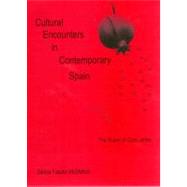Cultural Encounters in Contemporary Spain The Poetry of Clara Janes
, by Faszer-mcmahon, Debra- ISBN: 9780838757680 | 0838757685
- Cover: Hardcover
- Copyright: 7/1/2010
This book explores how Clara Janes's poetry mediates competing religious and cultural worldviews in the context of contemporary Spain, a geo-political region that is experiencing new relationships as a member of the European Union and as a destination for immigrants from diverse cultural and linguistic groups. Janes combines aesthetic innovation with a keen interest in cultural forms from outside the traditional boundaries of the West, making her poetry particularly suited for a study of the changing relationships in Spain between the West and its eastern or Oriental others
Previous critical studies have focused on feminist approaches to Janes's oeuvre. This study seeks to expand those discussions through an analysis of the aesthetics of cultural otherness (rather than simply gendered otherness) within Janes's prolific literary production
The first chapter addresses one of Janes's earliest cross-cultural texts, Kampa (1986), which voices a literary encounter between a Spanish poetic speaker and the renowned Czech poet Vladimir Holan. Kampa includes a musical and lyrical composition performed on tape, and its unconventional musical mode offers an alternative to divisions between western and non-western literary and musical forms
The second chapter analyzes Divan del opalo de fuego (O la leyenda de Layla y Machnun) (1996), a text that brings a famous Islamic legend about unification into the Spanish literary tradition for the first time. The legend originated in ancient Bedouin poetry, and is as famous in the Islamic world as Romeo and Juliet is in the West. Janes's Divan recalls the writings of San Juan de la Cruz and Petrarch, while singing the praises of Islamic mystical forms. The work thus brings diverse literary and cultural traditions into dialogue.
Janes's incorporation of Islamic mystical forms is once again evident in the third chapter, dedicated to Los secretos del bosque (2002), but Islamic forms are here set alongside Jewish, Christian, and Hindu philosophical and religious traditions. The text follows the stages of an alchemical process, and the combination of scientific, literary, and religious discourse highlights the intricate cultural relationships at the heart of Spain's and Janes's literary production.
The final chapter considers the juxtapositions of western and eastern philosophical traditions in Janes's most recent book of visual poetry, Espacios translucidos (2007). The work combines quotations from diverse historical and cultural regions, photographs filled with signs, and mystical language. Several signs that Janes mentions in the introduction (such as hieroglyphics and labyrinths) recall distant cultures and structures of belief that require (and have instigated) monumental efforts to "read." In a similar way, the quotations, modified photographs, and mystical poetry in Espacios translucidos exhibit an "otherness" that encourages new approaches to signs, cultural difference, and the self.
Previous critical studies have focused on feminist approaches to Janes's oeuvre. This study seeks to expand those discussions through an analysis of the aesthetics of cultural otherness (rather than simply gendered otherness) within Janes's prolific literary production
The first chapter addresses one of Janes's earliest cross-cultural texts, Kampa (1986), which voices a literary encounter between a Spanish poetic speaker and the renowned Czech poet Vladimir Holan. Kampa includes a musical and lyrical composition performed on tape, and its unconventional musical mode offers an alternative to divisions between western and non-western literary and musical forms
The second chapter analyzes Divan del opalo de fuego (O la leyenda de Layla y Machnun) (1996), a text that brings a famous Islamic legend about unification into the Spanish literary tradition for the first time. The legend originated in ancient Bedouin poetry, and is as famous in the Islamic world as Romeo and Juliet is in the West. Janes's Divan recalls the writings of San Juan de la Cruz and Petrarch, while singing the praises of Islamic mystical forms. The work thus brings diverse literary and cultural traditions into dialogue.
Janes's incorporation of Islamic mystical forms is once again evident in the third chapter, dedicated to Los secretos del bosque (2002), but Islamic forms are here set alongside Jewish, Christian, and Hindu philosophical and religious traditions. The text follows the stages of an alchemical process, and the combination of scientific, literary, and religious discourse highlights the intricate cultural relationships at the heart of Spain's and Janes's literary production.
The final chapter considers the juxtapositions of western and eastern philosophical traditions in Janes's most recent book of visual poetry, Espacios translucidos (2007). The work combines quotations from diverse historical and cultural regions, photographs filled with signs, and mystical language. Several signs that Janes mentions in the introduction (such as hieroglyphics and labyrinths) recall distant cultures and structures of belief that require (and have instigated) monumental efforts to "read." In a similar way, the quotations, modified photographs, and mystical poetry in Espacios translucidos exhibit an "otherness" that encourages new approaches to signs, cultural difference, and the self.






